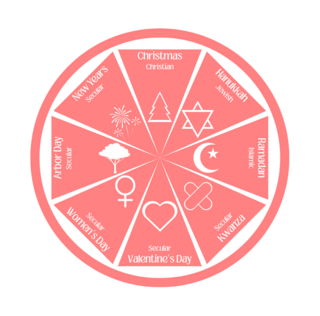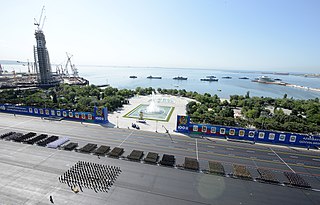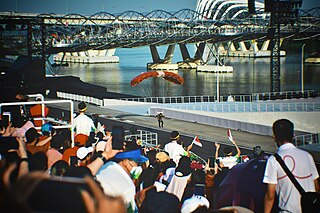Related Research Articles

A holiday is a day or other period of time set aside for festivals or recreation. Public holidays are set by public authorities and vary by state or region. Religious holidays are set by religious organisations for their members and are often also observed as public holidays in religious majority countries. Some religious holidays, such as Christmas, have become secularised by part or all of those who observe them. In addition to secularisation, many holidays have become commercialised due to the growth of industry.

Carnival or Shrovetide is a Christian festive season that occurs before Lent, consisting of Quinquagesima or Shrove Sunday, Shrove Monday, and Shrove Tuesday or Mardi Gras.

Diwali is the Hindu festival of lights, with variations celebrated in other Indian religions. It symbolises the spiritual "victory of light over darkness, good over evil, and knowledge over ignorance". Diwali is celebrated during the Hindu lunisolar months of Ashvin and Kartika—between around mid-September and mid-November. The celebrations generally last five or six days.
A golden jubilee marks a 50th anniversary. It variously is applied to people, events, and nations.

Youth Day or National Youth Day is a commemorative holiday in honour of young people, celebrated in different parts of the world on various dates throughout the year.

Holi is a popular and significant Hindu festival celebrated as the Festival of Colours, Love, and Spring. It celebrates the eternal and divine love of the deities Radha and Krishna. Additionally, the day signifies the triumph of good over evil, as it commemorates the victory of Vishnu as Narasimha over Hiranyakashipu. Holi originated and is predominantly celebrated in the Indian subcontinent, but has also spread to other regions of Asia and parts of the Western world through the Indian diaspora.

Republic Day is the name of a holiday in several countries to commemorate the day when they became republics.

Many nations around the world observe some kind of Armed Forces Day to honor their military forces. This day is not to be confused with Veterans Day or Memorial Day.

Public holidays in Italy are established by the Italian parliament and, with the exception of city or community patronal days, apply nationwide. These include a mix of national, religious and local observances. As for Whit Monday, there is an exception for South Tyrol. In Italy there are also State commemoration days, which are not public holidays.

The National Day of Spain is a national holiday held annually on 12 October. It is also traditionally and commonly referred to as the Día de la Hispanidad, commemorating Spanish legacy worldwide, especially in Hispanic America.

Independence Day, also known as National Day, is the independence day of the Federation of Malaya from the British Empire. It commemorates the Malayan Declaration of Independence of 31 August 1957, and is defined in article 160 of the Constitution of Malaysia. The day is marked by official and unofficial ceremonies and observances across the country.

The National Day Parade (NDP) is an annual parade held in Singapore to commemorate its independence. Held annually on 9 August, it is the main public celebration of National Day, and consists of a parade incorporating contingents of the Singapore Armed Forces, Ministry of Home Affairs, local institutions and community groups, followed by a cultural presentation featuring music, dance displays, parachuters, and a fireworks show.

Republic Day is a national holiday in India commemorating the adoption of the Constitution of India, and the country's transition to a republic which came into effect on 26 January 1950.
Fiji Week celebrations commenced on 7 October 2005, and culminated with Fiji Day on 10 October, the 35th anniversary of Fiji's independence from British colonial rule. The official program focused on forgiveness and unity. It culminated with a day of prayer and fasting on Fiji Day. Schools, towns, and villages featured religious and cultural programs, with major celebrations Suva, Lautoka, and Labasa. The festivities were organized by the Ministry of National Reconciliation and Unity, with the assistance of the Ministry of Home Affairs and Immigration.

Vardavar or Vartavar is a festival in Armenia where people drench each other with water.

A birthday is the anniversary of the birth of a person, or figuratively of an institution. Birthdays of people are celebrated in numerous cultures, often with birthday gifts, birthday cards, a birthday party, or a rite of passage.

Australia Day is the official national day of Australia. Observed annually on 26 January, it marks the 1788 landing of the First Fleet and raising of the Union Flag of Great Britain by Arthur Phillip at Sydney Cove, a small bay on the southern shore of Sydney Harbour. In present-day Australia, the government Australia Day Council organises events that seeks to recognise the contributions of Australians to the nation, while also encouraging reflection on past wrongs including towards Indigenous Australians and also giving respect and celebrating the diversity and achievements of Australian society past and present. The presentation of community awards and citizenship ceremonies are also commonly held on the day. The holiday is marked by the presentation of the Australian of the Year Awards on Australia Day Eve, announcement of the Australia Day Honours list and addresses from the governor-general and prime minister. It is an official public holiday in every state and territory. With community festivals, concerts and citizenship ceremonies, the day is celebrated in large and small communities and cities around the nation. Australia Day has become the biggest annual civic event in Australia.
Numerous events and festivals are held annually in Metro Manila. They include:

Independence Day of Turkmenistan is the main state holiday in Turkmenistan. This date is celebrated in Turkmenistan annually on September 27.

The Independence Day of Indonesia is a national holiday in Indonesia commemorating the anniversary of Indonesia's proclamation of independence on 17 August 1945. It was made a national holiday by government decree in 1946.
References
- ↑ Preparations Underway for Fiji Day Celebration, Fijian Broadcasting Corporation Limited, 9 October 2023, retrieved 19 March 2024
- ↑ Fiji’s 51st Anniversary as a Nation Celebrated, Colombo Plan Staff College, retrieved 19 March 2024
- ↑ National Day of Fiji 2023, The Diplomatic Insight, 10 October 2023, retrieved 19 March 2024